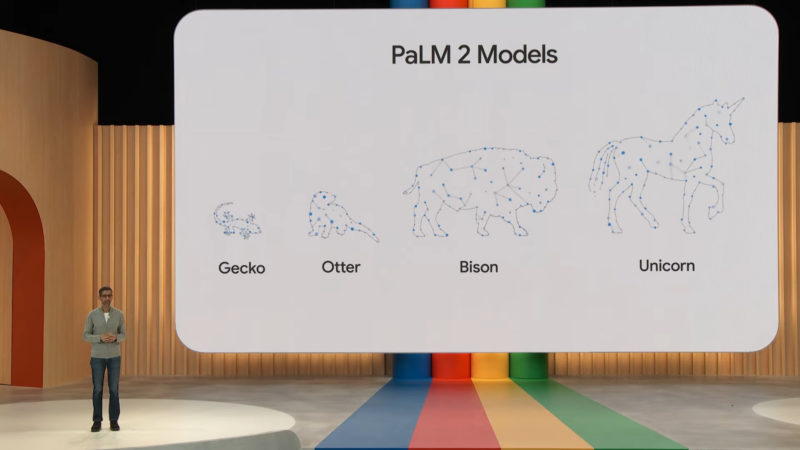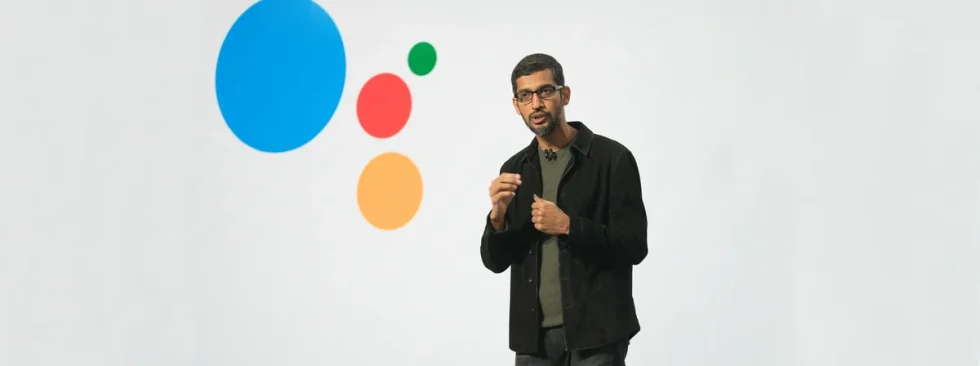
That Google I/O show sure was something, wasn't it? It was a rip-roaring two hours of nonstop AI talk without a break. Bard, Palm, Duet, Unicorn, Gecko, Gemini, Tailwind, Otter—there were so many cryptic AI code names thrown around it was hard to keep track of what Google was talking about. A glossary really would have helped. The highlight was, of course, the hardware, but even that was talked about as an AI delivery system.
Google is in the midst of a total panic over the rise of OpenAI and its flagship product, ChatGPT, which has excited Wall Street and has the potential to steal some queries people would normally type into Google.com. It's an embarrassing situation for Google, especially for its CEO Sundar Pichai, who has been pitching an "AI first" mantra for about seven years now and doesn't have much to show for it. Google has been trying to get consumers excited about AI for years, but people only seemed to start caring once someone other than Google took a swing at it.
Even more embarrassing is that the rise of ChatGPT was built on Google's technology. The "T" in "ChatGPT" stands for "transformer," a neural network technique Google invented in 2017 and never commercialized. OpenAI took Google's public research, built a product around it, and now uses that product to threaten Google.
In the months before I/O, Pichai issued a "Code Red" warning across the company, saying that ChatGPT was something Google needed to fight, and it even dragged its co-founders, Larry Page and Sergey Brin, out of retirement to help. Years ago, Google panicked over Facebook and mandated that all employees build social features in Google's existing applications. And while that was a widely hated initiative that eventually failed, Google is dusting off that Google+ playbook to fight OpenAI. It's now reportedly mandated that all employees build some kind of AI feature into every Google product.
"Mandatory AI" is certainly what Google I/O felt like. Each section of the presentation had some division of Google give a book report on the New AI Thing they have been working on for the past six months. Google I/O felt more like a presentation for Google's managers rather than a show meant to excite developers and consumers. The AI directive led to ridiculous situations like Android's head of engineering going on stage to talk only about an AI-powered poop emoji wallpaper generator rather than any meaningful OS improvements.
Wall Street investors were apparently one group excited by Google I/O —the company's stock jumped 4 percent after the show. Maybe that was the point of all of this.
An AI show with zero mentions of Google Assistant?
Would you believe Google Assistant got zero mentions at Google I/O? This show was exclusively about AI, and Google didn't mention its biggest AI product. Pichai's seminal "AI First" blog post from 2016 is about Google Assistant and features an image of Pichai in front of the Google Assistant logo. Google highlighted past AI projects like Gmail's Smart Reply and Smart Compose, Google Photos' magic eraser and AI-powered search, Deepmind's AlphaGo, and Google Lens, but Google Assistant could not manage a single mention. That seemed entirely on purpose.
Heck, Google introduced a product that was a follow-up to the Nest Hub Google Assistant smart display—the Pixel Tablet—and Google Assistant still couldn't get a mention. At one point, the presenter even said the Pixel Tablet had a "voice-activated helper."

Google's avoidance of Google Assistant at I/O seemed like a further deprioritization of what used to be its primary AI product. The Assistant's last major speaker/display product launch was two years ago in March 2021. Since then, Google shipped hardware that dropped Assistant support from Nest Wi-Fi and Fitbit, and it disabled Assistant commands on Waze. It lost a patent case to Sonos and stripped away key speaker functionality, like controlling the volume, from the cast feature. Assistant Driving Mode was shut down in 2022, and one of the Assistant's biggest features, reminders, is getting shut down in favor of Google Tasks Reminders.
The Pixel Tablet sure seemed like it was supposed to be a new Google Assistant device since it looks exactly like all of the other Google Assistant devices, but Google shipped it without a dedicated smart display interface. It seems like it was conceived when the Assistant was a viable product at Google and then shipped as leftover hardware when Assistant had fallen out of favor.
The Google Assistant team has reportedly been asked to stop working on its own product and focus on improving Bard. The Assistant hasn't really ever made money in its seven years; the hardware is all sold at cost, voice recognition servers are expensive to run, and Assistant doesn't have any viable post-sale revenue streams like ads. Anecdotally, it seems like the power for those voice recognition servers is being turned way down, as Assistant commands seem to take several seconds to process lately.



3175x175(CURRENT).thumb.jpg.b05acc060982b36f5891ba728e6d953c.jpg)


Recommended Comments
There are no comments to display.
Join the conversation
You can post now and register later. If you have an account, sign in now to post with your account.
Note: Your post will require moderator approval before it will be visible.